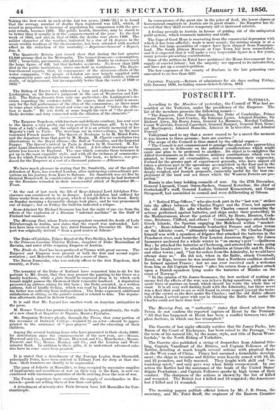A "Retired Flag-Officer," who also took part in the "last
war," strikes into the affray between Sir Charles Napier and the Times, but against the old Admiral. Be asks 'whether 'Sir Miles cannot remembbç the actions performed against batteries, and ships under their protectifsis).iii the Mediterranean, about the period of 1811, by Hoste, Brenton, Coch- rane, Brisbane, Clifford, and others ? Commodore Sprenger attacked the Greek Islands, the Spartan engaging the Afolehead within " musket- shot" ; Rear-Admiral Fremantle bombarded Pommy and other towns on the Adriatic coast, "ultimately taking Trieste"; Sir Charles Napier himself was with a squadron of frigates that attacked the batteries in the Penobscot river, and burnt the New London American frigate. Sir James Saumarez anchored for a whole winter in "an enemy's port "—Quiberon Bay ; he attacked the batteries at Cherbourg, and arrested the works going on at the breakwater ; he attacked the batteries at Qranville and St. Malo, and other towns ; and, "but for orders from the Admiralty, he would have oftener done so." He did not, when in the Baltic, attack Cronstadt, Revel, or Riga, because he was anxious that a Northern coalition should be formed against France; but no one ever received such a welcome from him as did Captain Stewart "after his return from a gallant attack upon a Danish squadron lying under the batteries of Mardoe on the coast of Norway.' "In the opinion of Sir James Saumarez, the best method of making an enemy feel the effects of the war, was to have flying squadrons, with an ade- quate force of marines on board, which should lay waste the whole line of coast. It is all very well finding fault with the Admiralty but there never was a fleet that went to sea so well found in every respect (except the train:. ing of the crews) as the fleet under Sir Charles ; and the old Baltic officers with whom I served agree with you in thinking the Baltic fleet under Sir Charles could not have done less."


























 Previous page
Previous page